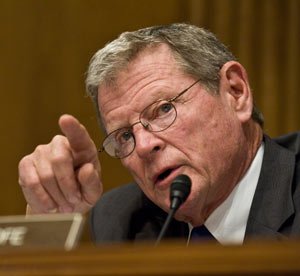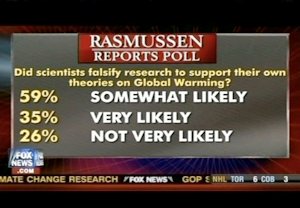Rethinking AGW, Part 7: Questioning Authority
 | | At least we can all agree that Malkovich Malkovich Malkovich |
"Consensus" is defined as "majority of opinion" by Dictionary.com. Though the truth is beholden to nothing, science operates by consensus, by a majority of scientists coming to a general agreement. There is nearly always a minority opinion, but when it comes to scientific theories, the consensus that emerges from careful consideration, experimentation, and peer review is a rightfully difficult thing to change. People who have problems with or misunderstand the scientific method--for example, evolution deniers--like to argue that science is always changing, that today's consensus could easily be tomorrow's luminiferous aether. However, this is a flawed argument, because science progresses by gradual modification and clarification, not by fickle paradigm shifts. Whenever a scientific theory, such as the theory of relativity, reaches a strong consensus after years of vetting, it would take a ludicrous amount of evidence to tear that theory down and replace it with something entirely different. There may be subtle flaws in the details of any given theory, but theories are usually tweaked by better understanding, not switched out wholesale.
Many proponents of anthropogenic global warming (AGW) are quick to give the theory as much prestige as some of science's oldest, most embedded, and most universally accepted theories, to argue that those who are skeptical of AGW should be equated with HIV denialists, young Earth creationists, anti-vaccination advocates, and even Holocaust deniers. Three of the biggest sources of scientific data on AGW--as cited by the IPCC, the subject of a future installment--are the NOAA, NASA, and the CRU, all of which appear to be united in the conclusion that manmade climate change is real, that it's a serious problem with catastrophic consequences, and that something needs to be done immediately to counteract it. If these three bodies are operating in good faith and with adequate transparency, it would be beyond arrogant for a layman like myself to question their consensus on the sole basis of gut feelings, political leanings, and paranoid suspicions. In other words, if these entities are worthy of our trust, only a fool would bet against them. This raises the obvious question, which I shall tackle carefully and systematically: are the NOAA, NASA, and the CRU worthy of our trust?
Let's start with the NOAA, the National Oceanic and Atmospheric Administration. The NOAA is an arm of the U.S. Department of Commerce with a reach that "goes from the surface of the sun to the depths of the ocean floor." Its mission is "to understand and predict changes in climate, weather, oceans, and coasts, to share that knowledge and information with others, and to conserve and manage coastal and marine ecosystems and resources." For the most part, the NOAA's reputation is beyond reproach and its research should be trusted, especially when it tells you that you should evacuate your area immediately.
 | | Senator Inhofe wants YOU to doubt global warming |
However, noted climate change skeptic and Republican United States Senator James Inhofe has suggested that "NOAA employees potentially violated federal contract law and engaged in data manipulation," as revealed by an investigation he requested by the Commerce Department's Inspector General. In the report, the OIG recommends further investigation into some problematic e-mails between the NOAA and the CRU concerning climate change data. The NOAA, in response, apparently misrepresented the facts. The report was issued following "Climategate" (more on that further down), but as of this writing, no additional follow-up has occurred.
Setting aside the possible conflict of political interest that results from the NOAA being entirely government-run and currently headed by Obama appointees, I'd still be willing to give the NOAA the benefit of the doubt, as long as the other two sources are immune from criticism. Suspicious e-mails that call for "further investigation" are pretty far from bullet-proof evidence of irreparably damning bias. After all, I don't consider Inhofe--who has for years been swamping every government agency he can with requests for investigations into anything that can raise AGW skepticism--even remotely unbiased.
That brings us to NASA, specifically the Goddard Institute for Space Studies, NASA's component research laboratory devoted to global climate change. As with the NOAA, the GISS receives almost all of its funding from the U.S. government, but it wouldn't be helpful to rehash the problem of publication bias. Let's make the admittedly ridiculous assumption that the U.S. government has no bias when it comes to AGW and that all its funding is given in good faith. That funding, in the case of the GISS, fell into the hands of its director, a man by the name of James E. Hansen. Hansen is a multiple award-winning scientist who was elected to the National Academy of Sciences in 1996. When it comes to AGW activism, he was ahead of the curve in the early eighties, publishing his first paper on the subject in 1981 and ultimately appearing before Congress to testify that greenhouse gases are a serious problem in 1988.
 | | Hansen's Congressional testimony is often credited with launching the modern AGW movement |
He has also called for putting oil company CEOs on trial on the grounds of "high crimes against humanity and nature," has testified on behalf of eco-terrorists, and was arrested three times for participating in illegal and disruptive demonstrations against mountaintop removal mining and the proposed Keystone pipeline. He is "increasingly isolated among climate activists" for his shrill, catastrophic, and combative take on the issue. Even famed physicist Freeman Dyson, a friend of Hansen, has said, "The person who is really responsible for this overestimate of global warming is Jim Hansen. He consistently exaggerates all the dangers... Hansen has turned his science into ideology." In other words, nobody in their right mind should call James Hansen a dispassionate, objective scientific observer of reality, and as a result, it is impossible to conclude that all data coming from the GISS is inherently trustworthy.
As for NASA itself, it was recently and very publically critiqued by nearly 50 former NASA scientists and astronauts for "including unproven remarks in public releases and websites." The critique goes on to say that "with hundreds of well-known climate scientists and tens of thousands of other scientists publicly declaring their disbelief in the catastrophic forecasts, coming particularly from the GISS leadership, it is clear that the science is NOT settled. The unbridled advocacy of CO2 being the major cause of climate change is unbecoming of NASA’s history of making an objective assessment of all available scientific data prior to making decisions or public statements." Indeed, NASA would probably recapture some of its damaged reputation by distancing itself from the incendiary James Hansen.
This brings me, at long last, to the CRU, the Climatic Research Unit of the University of East Anglia. The CRU, compared to the NOAA and NASA, is a very small organization, but it--and especially its director, Phil Jones--is highly respected in climate science circles. It also has the benefit of not being run or funded by the U.S. government. However, if you've heard of the CRU, you've undoubtably heard about "Climategate" (and maybe its recent sequel, "Climategate 2.0"), an illegal release of private e-mails and internal documents that purport to demonstrate scientists behaving poorly, manipulating data to achieve political goals, and attempting to smear AGW skeptics rather than refute them.
 | | The CRU: clearly not winning the PR battle |
The most remarkable thing about the Climategate scandal is that it doesn't seem to have changed much. AGW alarmists are shockingly dismissive of the e-mails, whereas denialists greatly overstate what they mean. I can't claim to have gone through every single released document and e-mail, but from what I've seen, there isn't enough to completely condemn the CRU or throw out all of its science. There is enough to raise eyebrows, and I find the multiple "independent" inquiries into the matter to be largely unconvincing. If the CRU and UEA are truly innocent of manipulating the data, they are still and unquestionably guilty of a lack of proper transparency and an unprofessional and unscientific disregard for fellow scientists who disagree with them.
Therefore, I am left with two conspiracy theories. On one hand, I have the possibility that a cabal of powerful scientists have been tainted by ideology and confirmation bias and have used their prestige to blow this whole issue completely out of proportion, with the help of governments that are all too willing to find new ways of exerting power over private enterprise. On the other hand, I have the possibility that a determined clique of greedy capitalists and oil barons has come together to spread disinformation wherever they can and to wreck the reputations of innocent and honest scientific research organizations. Both of these conspiracy theories are, in my eyes, hard to accept, and the best way to determine which theory a person is more likely to believe is to check their political party affiliation, hardly a measure of scientific evidence.
So, when looking at the NOAA, NASA, and the CRU, I am left unconvinced as to whether or not they deserve my trust. Whether it's because of hints of behind-the-scenes wrongdoing, because of political and financial conflicts of interest, because of untamed personalities with an abundance of power, or because of vocal and professional skeptics who can't be easily ignored, I find the "consensus" of these bodies potentially dubious. Again, I am left with an infuriating uncertainty. I want to have faith in the scientific data, but all the evidence available to me, as a non-scientist, is not enough to overcome my doubts. If "extraordinary claims require extraordinary evidence," I'm going to need more than the words of these three entities to go on.
-e. magill 5/22/2012
|
|